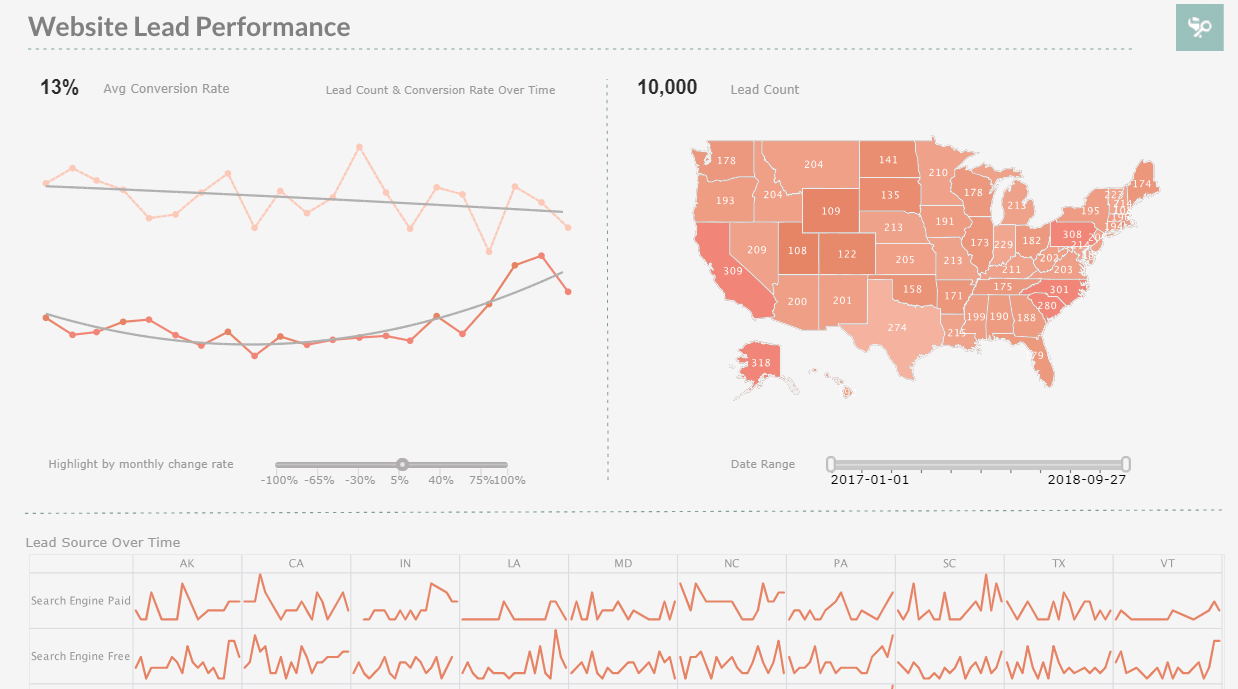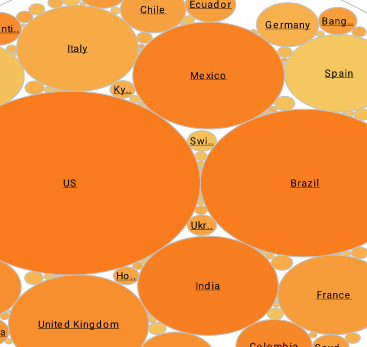The First Marketing Reports to Build
In the world of marketing, having a clear roadmap matters. This is where marketing reports come into play. They don't just show us our past moves, they help us shape our next steps.
With 63% of businesses increasing their digital marketing budgets in past years, it's evident that the role of marketing reports has never been more crucial. Without these 7 fundamental reports, it's easy for even the best marketing strategies to drift off course.
This article will explain the top marketing reports, highlighting their crucial role in guiding successful campaigns.
| #1 Ranking: Read how InetSoft was rated #1 for user adoption in G2's user survey-based index | Read More |
Understanding Marketing Reporting
A marketing report is a structured document that presents the performance and outcomes of marketing strategies and campaigns. It translates raw data into actionable insights, highlighting successes, areas for improvement, and trends. These reports help businesses to make informed decisions and refine their marketing approaches.
Navigating Timelines: Digital Marketing Report Frequencies
The frequency of creating a marketing report largely depends on the business's objectives and the nature of its campaigns:
- Daily, weekly : best for fast-paced campaigns, allowing for real-time monitoring and swift strategy adjustments. For more extended campaigns, a weekly marketing report can help assess if everything is progressing as intended, allowing teams to spot potential issues and refine the strategy if needed.
- Monthly : A widely favored interval for regular marketing initiatives. Monthly reports provide a panoramic view of ongoing efforts, consolidating data from daily and weekly feedback. This allows businesses to identify patterns, measure short-term ROI, and make adjustments that might be missed with longer intervals.
- Quarterly/Yearly: Quarterly marketing reporting focuses on granular strategic evaluations, which are particularly crucial in industries influenced by seasonal variations. They also allow businesses to fine-tune their strategies in line with evolving market demands and set goals for the upcoming quarter. On the other hand, yearly reports present an exhaustive audit of a company's marketing trajectory over an entire year, contributing to budgeting, goal setting, and strategic development.
Additionally, special reports might be generated based on specific goals or upon the request of stakeholders, ensuring tailored insights for precise decision-making.
Must-Do Types of Marketing Reports
In the dynamic realm of marketing, precision and direction are essential. This clarity is achieved through meticulously curated marketing reports, each addressing distinct facets of your promotional campaigns. These reports, both overarching and specific, transform raw data into comprehensive insights. As we delve deeper into the various types of marketing reports, let's first examine the diverse channels that businesses are employing in today's digital landscape.
1. Marketing Executive Report
A marketing executive report serves as a snapshot of the overall marketing performance. It encapsulates the effectiveness of various campaigns, provides a holistic view of spending vs. returns, and identifies potential areas of growth or adjustment. It's essential to include data here from all marketing channels to identify high-value drivers, a budget-to-ROI comparison for cost-effectiveness, customer engagement metrics for audience interaction insight, and traffic and conversion trends to gauge campaign health and areas for refinement.
2. Marketing Channels Report
Having a grasp on these popular channels underlines the importance of tailored reports. With such a varied landscape of marketing avenues, it has become imperative to have specialized reports for each to ensure optimal strategy and performance.
3. SEO Report
SEO reports are fundamental in the digital landscape. They allow marketers to track, analyze, and showcase a website's performance across search engines. The insights from these reports determine how effectively a site ranks for particular keywords and highlight necessary tweaks.
A thorough SEO report starts with keyword rankings, showing where your site is positioned in various regions. An exhaustive SEO report invariably kicks off with keyword rankings, delineating the exact position your website occupies across diverse locations. Utilizing a robust SEO tool, such as the SE Ranking keyword rank checker, enriches the report by laying bare organic traffic trajectories and assessing their quality.
Beyond these metrics, it's also crucial to consider organic traffic, backlinks, referring domains, website health scores, and conversions. Utilizing a range of SEO tools and web analytics platforms, marketers can gain a deep understanding of performance details and identify areas that need enhancement.
 |
View live interactive examples in InetSoft's dashboard and visualization gallery. |
4. Social Media and PR Reports
In today's interconnected age, the significance of monitoring social media and PR performance cannot be understated. These reports serve as invaluable tools, elucidating how audiences perceive the brand, the depth of engagement, and the potency of content strategies spread across various platforms. For a comprehensive assessment, it's pivotal to incorporate specific metrics such as engagement rates, the trajectory of follower growth, the breadth of content reach and shares, mentions in PR campaigns, sentiment analysis results, and the ripple effects of collaborations with influencers.
5. Email Performance Report
Despite the rapid evolution of digital platforms, email stands strong as an enduring asset for marketers. Analyzing email marketing performance is fundamental for gauging the success of campaigns, increasing subscriber engagement, and obtaining tangible conversion outcomes. A thorough email marketing analysis should spotlight key metrics. This encompasses open rates, which indicate initial engagement, and click-through rates, which shed light on email newsletter performance. Additionally, conversion metrics offer insight into final actions taken, while unsubscribe rates and segment-specific performance data provide clarity on audience segmentation and retention dynamics.
6. PPC Campaign Report
Pay-per-click (PPC) campaigns, with their direct cost implications, demand meticulous oversight to guarantee the best returns on investment. Notably, PPC returns $2 for every $1 spent, a remarkable 200% ROI! By delving into PPC reports, marketers can discern the potency of their advertisements in not just attracting clicks, but, more crucially, driving conversions.
Essential metrics include click-through rates to assess ad relevance and conversion rates to measure effectiveness. Monitoring cost-per-click and ad spending is vital for budgetary control, while quality scores reflect ad relevance and performance. Data from various ad groups further refine understanding, ensuring each segment operates at its peak.
7. Ecommerce Reporting
For those in online retail, e-commerce reports are a beacon. They illuminate the path customers take on their shopping journey. Diving deep into these reports, businesses can grasp how customers shop and spot any hiccups they might face during the checkout process. E-commerce performance hinges on specific metrics. The average order value provides insights into customer spending patterns, while cart abandonment rates reveal challenges in the buying journey. Notably, 28% of shoppers leave their carts if forced to create an account to complete the purchase. Understanding a customer's lifetime value is a cornerstone for long-term planning.
Analyzing sales by categories or individual products highlights top performers. Additionally, examining the conversion funnel offers insights into potential customer drop-off points and areas for optimization. Reports in the business world are far from one-size-fits-all. Each serves its distinct purpose, offering a lens into different marketing arenas. But when you put them all together, what emerges is a complete, detailed image, arming businesses with the knowledge they need to power up their marketing game.

